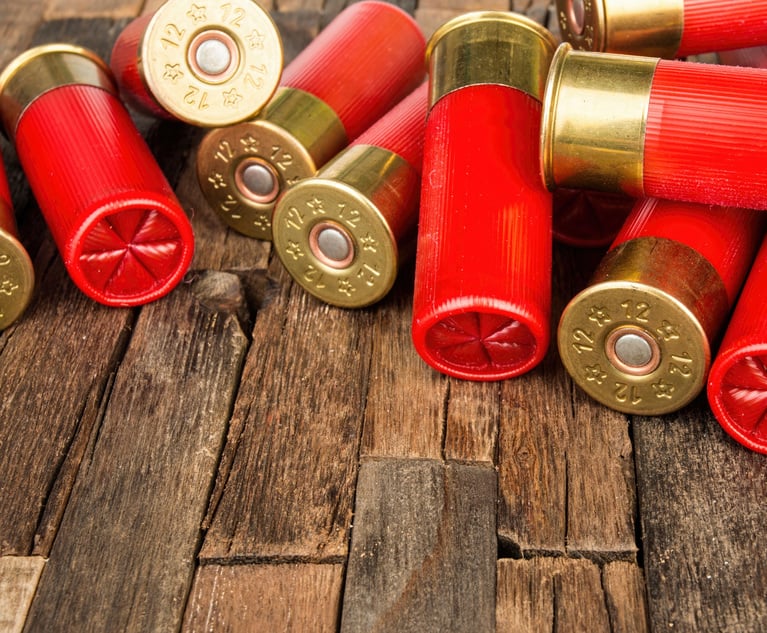Voter ID's Worst Enemy: Houston Lawyer Who Stopped the Law Twice on How He Did It
Houston lawyer Chad Dunn has twice prevented Texas from implementing one of the strictest voter ID laws in the nation. He tells the Texas Lawyer how he pullled it off.
August 24, 2017 at 03:00 PM
4 minute read
Houston lawyer Chad Dunn has twice prevented Texas from implementing one of the strictest voter ID laws in the nation. Just this week, he convinced a federal judge for the second time the Texas Legislature passed those laws with a 'discriminatory purpose' to keep Hispanic and African-Americans away from the voting booth. Dunn, who represents the plaintiffs opposed to the laws in Veasey v. Abbott, spoke with Texas Lawyer about how he convinced the court to strike down the state's latest attempt at a voter ID law, what may happen on appeal, and whether the U.S. Supreme Court will finally have to consider Texas' law on its merits to put the issue to rest.
Texas Lawyer: For the second time, U.S. District Judge Nelva Ramos has given you exactly what you wanted by declaring that Texas' Voter I.D. is discriminatory — specifically that the Texas Legislature passed it to discriminate against Hispanics and African Americans. What was your strongest evidence that prompted this ruling?
Chad Dunn: Texas engaged in what we call picking and choosing. When they picked which IDs would be allowed, they selected IDs that were disproportionately held by whites. Other reliable government-issued IDs that were held more often by Latinos and African-Americans were not included. Even in the latest bill they rushed through, some of the so-called fixes they added to the ID requirements benefited whites disproportionately. Then, the legislature appropriated no new money for a voter education campaign under either S.B. 14 or the new S.B. 5 bill. Legislative leaders were told the bill would disproportionately harm minority voters and they ran past practically every legislative rule of procedure to jam the bill through. The evidence offered took weeks to present and was overwhelming.
This content has been archived. It is available through our partners, LexisNexis® and Bloomberg Law.
To view this content, please continue to their sites.
Not a Lexis Subscriber?
Subscribe Now
Not a Bloomberg Law Subscriber?
Subscribe Now
NOT FOR REPRINT
© 2024 ALM Global, LLC, All Rights Reserved. Request academic re-use from www.copyright.com. All other uses, submit a request to [email protected]. For more information visit Asset & Logo Licensing.
You Might Like
View All
Overtime Rewind: Texas Court Ruling Unravels FLSA Salary Level Increases
4 minute read
Divided 5th Circuit Shoots Down Nasdaq Diversity Rules

Uvalde Shooting 'Fresh in Everyone's Mind:' Lone Dissenting Judge Disagrees with School's Disciplinary Decision Over Pellet Gun

Amazon, SpaceX Press Constitutional Challenges to NLRB at 5th Circuit
Trending Stories
Who Got The Work
Michael G. Bongiorno, Andrew Scott Dulberg and Elizabeth E. Driscoll from Wilmer Cutler Pickering Hale and Dorr have stepped in to represent Symbotic Inc., an A.I.-enabled technology platform that focuses on increasing supply chain efficiency, and other defendants in a pending shareholder derivative lawsuit. The case, filed Oct. 2 in Massachusetts District Court by the Brown Law Firm on behalf of Stephen Austen, accuses certain officers and directors of misleading investors in regard to Symbotic's potential for margin growth by failing to disclose that the company was not equipped to timely deploy its systems or manage expenses through project delays. The case, assigned to U.S. District Judge Nathaniel M. Gorton, is 1:24-cv-12522, Austen v. Cohen et al.
Who Got The Work
Edmund Polubinski and Marie Killmond of Davis Polk & Wardwell have entered appearances for data platform software development company MongoDB and other defendants in a pending shareholder derivative lawsuit. The action, filed Oct. 7 in New York Southern District Court by the Brown Law Firm, accuses the company's directors and/or officers of falsely expressing confidence in the company’s restructuring of its sales incentive plan and downplaying the severity of decreases in its upfront commitments. The case is 1:24-cv-07594, Roy v. Ittycheria et al.
Who Got The Work
Amy O. Bruchs and Kurt F. Ellison of Michael Best & Friedrich have entered appearances for Epic Systems Corp. in a pending employment discrimination lawsuit. The suit was filed Sept. 7 in Wisconsin Western District Court by Levine Eisberner LLC and Siri & Glimstad on behalf of a project manager who claims that he was wrongfully terminated after applying for a religious exemption to the defendant's COVID-19 vaccine mandate. The case, assigned to U.S. Magistrate Judge Anita Marie Boor, is 3:24-cv-00630, Secker, Nathan v. Epic Systems Corporation.
Who Got The Work
David X. Sullivan, Thomas J. Finn and Gregory A. Hall from McCarter & English have entered appearances for Sunrun Installation Services in a pending civil rights lawsuit. The complaint was filed Sept. 4 in Connecticut District Court by attorney Robert M. Berke on behalf of former employee George Edward Steins, who was arrested and charged with employing an unregistered home improvement salesperson. The complaint alleges that had Sunrun informed the Connecticut Department of Consumer Protection that the plaintiff's employment had ended in 2017 and that he no longer held Sunrun's home improvement contractor license, he would not have been hit with charges, which were dismissed in May 2024. The case, assigned to U.S. District Judge Jeffrey A. Meyer, is 3:24-cv-01423, Steins v. Sunrun, Inc. et al.
Who Got The Work
Greenberg Traurig shareholder Joshua L. Raskin has entered an appearance for boohoo.com UK Ltd. in a pending patent infringement lawsuit. The suit, filed Sept. 3 in Texas Eastern District Court by Rozier Hardt McDonough on behalf of Alto Dynamics, asserts five patents related to an online shopping platform. The case, assigned to U.S. District Judge Rodney Gilstrap, is 2:24-cv-00719, Alto Dynamics, LLC v. boohoo.com UK Limited.
Featured Firms
Law Offices of Gary Martin Hays & Associates, P.C.
(470) 294-1674
Law Offices of Mark E. Salomone
(857) 444-6468
Smith & Hassler
(713) 739-1250






